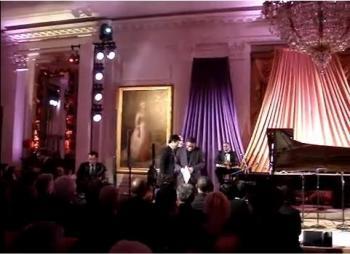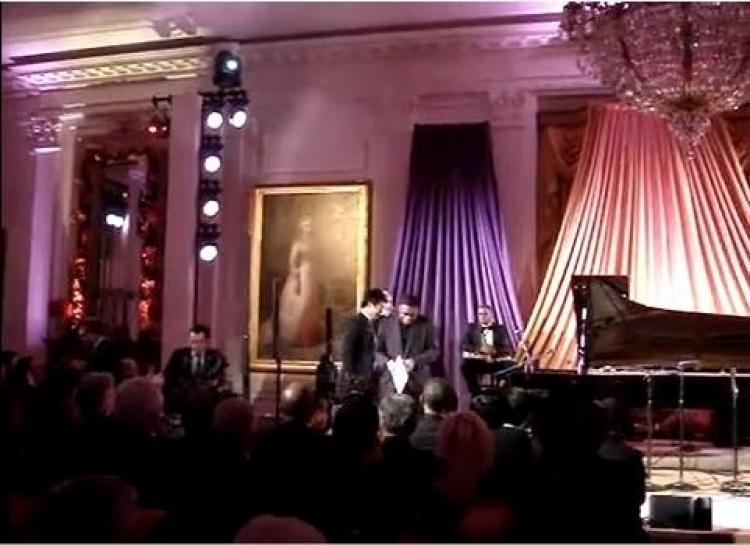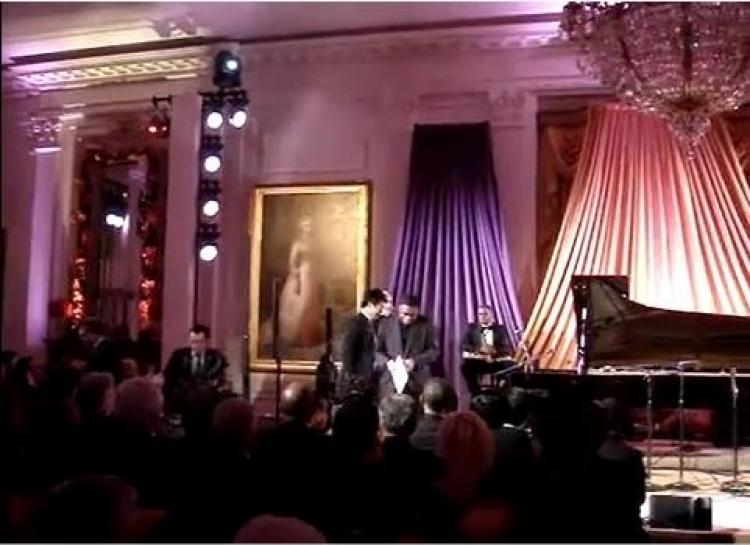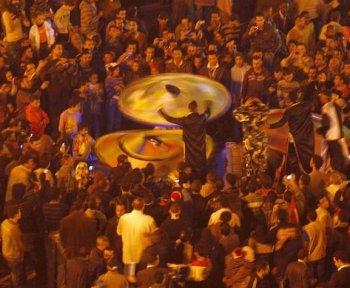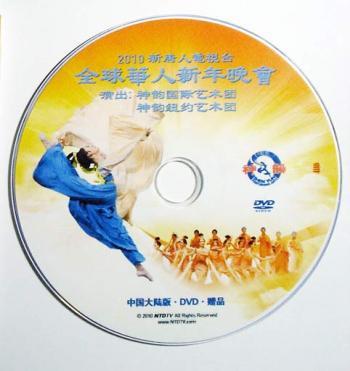Lang Lang is best known around the world as a brilliant classical pianist. Inside the Chinese Communist Party (CCP) he is known for using his performances to aid the Chinese regime’s diplomacy and for being an official in the Party’s umbrella youth organization.
The question of Lang Lang’s relationship to the CCP came to the fore after he played the anti-American song My Motherland during the recent state banquet for Hu Jintao at the White House. The song was a staple of the Maoist era and has been used in nationalist propaganda for decades; the lyrics refer to Americans as “jackals” who should be greeted with a “hunting rifle.”
Afterwards, in an interview with NPR, he said that he had no idea there were political connotations to the tune, and that he was “not a politician.” This is when the online community began digging around, and a number of facts have since emerged that complicate Lang Lang’s professions of innocence.
Since August of last year, Lang Lang has been one of 16 individuals holding the position of Vice-Chairman of the All China Youth Federation, one of the main “People’s Organizations under the leadership of the Chinese Communist Party.” Hu Jintao himself used to be the Chairman of this organization. Li Keqiang, the cadre next in line for premiership, was a former vice-chair, the same position as Lang Lang holds.
As a “mass patriotic united front organization” the Federation plays an important role in the world of Chinese communist politics. It combines 52 youth organizations and claims on its website to reach “over 300 million” Chinese young people. One of the organization’s “basic tasks” is to “rally and educate young people from every ethnic group … to study Marxism-Leninism, Mao Zedong Thought, Deng Xiaoping Theory and Jiang Zemin’s Three Represents,” according to the organization’s website.
According to Chinese Social Democratic Party Secretary-General and former Associate Professor of History in China, Liu Yinquan, Lang Lang is an “official artist” of the regime.
Whether that is the case or not, the Party is openly proud of Lang Lang’s contributions. Lang Lang’s father told a Nanfang Daily reporter that during Hu Jintao’s visit to Germany in December 2005, Lang Lang played the final movement of the Yellow River Concerto, ‘Defending the Yellow River,’ during the welcome ceremony at the German presidential palace.
The Yellow River Concerto premiered during the Cultural Revolution. ‘Defending the Yellow River’ includes quotations from The East is Red, which served as an anthem for communist China during the Cultural Revolution, and the Internationale, considered the anthem for international socialism and communism.
After Lang Lang’s performance, the CCP Vice-Minister of Culture said, “China has one thousand pandas, but only one Lang Lang.” The CCP Foreign Minister Li Zhaoxing specifically went to visit Lang Lang the next day at his hotel. Li left a message saying, “Lang Lang, thank you for the great contribution you made to China’s diplomatic efforts!”
Such contributions have been high-profile and consistent. During the 2008 Beijing Olympics Lang Lang was selected as an ambassador and performed during the opening ceremony. Then, last year, he was given a series of “ambassador” titles: in April for the Shanghai World Expo where he also performed during the opening ceremony, in May for the Shenzhen World University Games, in August for the city of Shenyang. In November he performed during the opening ceremony of the Guangzhou Asian Games.
Lang Lang often likes to perform “red songs,” known as such because they are meant to inspire devotion to the Communist Party. For example, during the 2006 official “CCTV New Year’s Gala,” he played Days of Emancipation and My Motherland. Days of Emancipation is typical of tunes which glorify the Communist Party. This one was music from the 1953 movie The Great Land Reform, which celebrates the CCP’s initial campaign to destroy the old China, in which millions of people identified as “landlords” were tortured and killed.
Party media have declared Lang Lang “The youngest piano master in the world,” and “A young man who will change the world,” among other titles.
The pianist’s case has also entered into academic discourse. Yinghong Cheng, an assistant professor of history at Delaware State University who researches Chinese communism, has used the term “identity cheating” to describe Lang Lang’s dual existence, in an article in the Chinese journal China in Perspective. “He presents himself as an innocent artist in the West and asks people not to listen to his music with a political ear, but in … the Chinese world he never forgets to remind people that he is a patriotic pianist, especially when he plays in the West.”
Cheng says that the dual identity—a product of lying to the West about his Chinese identity—has become a privilege that “secures and enhances his fame and comfort in high societies in both China and the West, a privilege that 99 percent of ordinary Chinese—whose Chinese identity is never clouded by any foreign connections—never dream.”
Further, several commentators have looked to mine Lang Lang’s biography, published in May 2008, for keys to understanding his relationship to the Party. Liu sees in the biography a document showing the effects of Party teachings on family relationships.
In it Lang Lang describes how he was put to extreme methods of training by his father as a child, including threats of death for underperformance on the piano.
Liu, the former professor, believes that “Lang Lang’s father is a typical example of someone who grew up under the CCP’s false and violent philosophy of ‘battle with heaven, fight with earth.’”
Liu said, “Looking at Lang Lang and his father, we can see the fruits of brainwashing by the CCP’s culture. Chinese traditional culture believes that one should respect elders, care for the young, and have ethical human relationships.”
All this was destroyed by the CCP, Liu says, and human nature distorted. “People lost their conscience and their judgment of right and wrong,” he said, adding that generations of Chinese have now grown up indoctrinated in this manner.
Updated Jan. 31, 1:47 ET. Read the original Chinese article
Comment: [email protected]
The question of Lang Lang’s relationship to the CCP came to the fore after he played the anti-American song My Motherland during the recent state banquet for Hu Jintao at the White House. The song was a staple of the Maoist era and has been used in nationalist propaganda for decades; the lyrics refer to Americans as “jackals” who should be greeted with a “hunting rifle.”
Afterwards, in an interview with NPR, he said that he had no idea there were political connotations to the tune, and that he was “not a politician.” This is when the online community began digging around, and a number of facts have since emerged that complicate Lang Lang’s professions of innocence.
Since August of last year, Lang Lang has been one of 16 individuals holding the position of Vice-Chairman of the All China Youth Federation, one of the main “People’s Organizations under the leadership of the Chinese Communist Party.” Hu Jintao himself used to be the Chairman of this organization. Li Keqiang, the cadre next in line for premiership, was a former vice-chair, the same position as Lang Lang holds.
As a “mass patriotic united front organization” the Federation plays an important role in the world of Chinese communist politics. It combines 52 youth organizations and claims on its website to reach “over 300 million” Chinese young people. One of the organization’s “basic tasks” is to “rally and educate young people from every ethnic group … to study Marxism-Leninism, Mao Zedong Thought, Deng Xiaoping Theory and Jiang Zemin’s Three Represents,” according to the organization’s website.
According to Chinese Social Democratic Party Secretary-General and former Associate Professor of History in China, Liu Yinquan, Lang Lang is an “official artist” of the regime.
Whether that is the case or not, the Party is openly proud of Lang Lang’s contributions. Lang Lang’s father told a Nanfang Daily reporter that during Hu Jintao’s visit to Germany in December 2005, Lang Lang played the final movement of the Yellow River Concerto, ‘Defending the Yellow River,’ during the welcome ceremony at the German presidential palace.
The Yellow River Concerto premiered during the Cultural Revolution. ‘Defending the Yellow River’ includes quotations from The East is Red, which served as an anthem for communist China during the Cultural Revolution, and the Internationale, considered the anthem for international socialism and communism.
After Lang Lang’s performance, the CCP Vice-Minister of Culture said, “China has one thousand pandas, but only one Lang Lang.” The CCP Foreign Minister Li Zhaoxing specifically went to visit Lang Lang the next day at his hotel. Li left a message saying, “Lang Lang, thank you for the great contribution you made to China’s diplomatic efforts!”
Such contributions have been high-profile and consistent. During the 2008 Beijing Olympics Lang Lang was selected as an ambassador and performed during the opening ceremony. Then, last year, he was given a series of “ambassador” titles: in April for the Shanghai World Expo where he also performed during the opening ceremony, in May for the Shenzhen World University Games, in August for the city of Shenyang. In November he performed during the opening ceremony of the Guangzhou Asian Games.
Lang Lang often likes to perform “red songs,” known as such because they are meant to inspire devotion to the Communist Party. For example, during the 2006 official “CCTV New Year’s Gala,” he played Days of Emancipation and My Motherland. Days of Emancipation is typical of tunes which glorify the Communist Party. This one was music from the 1953 movie The Great Land Reform, which celebrates the CCP’s initial campaign to destroy the old China, in which millions of people identified as “landlords” were tortured and killed.
Party media have declared Lang Lang “The youngest piano master in the world,” and “A young man who will change the world,” among other titles.
The pianist’s case has also entered into academic discourse. Yinghong Cheng, an assistant professor of history at Delaware State University who researches Chinese communism, has used the term “identity cheating” to describe Lang Lang’s dual existence, in an article in the Chinese journal China in Perspective. “He presents himself as an innocent artist in the West and asks people not to listen to his music with a political ear, but in … the Chinese world he never forgets to remind people that he is a patriotic pianist, especially when he plays in the West.”
Cheng says that the dual identity—a product of lying to the West about his Chinese identity—has become a privilege that “secures and enhances his fame and comfort in high societies in both China and the West, a privilege that 99 percent of ordinary Chinese—whose Chinese identity is never clouded by any foreign connections—never dream.”
Further, several commentators have looked to mine Lang Lang’s biography, published in May 2008, for keys to understanding his relationship to the Party. Liu sees in the biography a document showing the effects of Party teachings on family relationships.
In it Lang Lang describes how he was put to extreme methods of training by his father as a child, including threats of death for underperformance on the piano.
Liu, the former professor, believes that “Lang Lang’s father is a typical example of someone who grew up under the CCP’s false and violent philosophy of ‘battle with heaven, fight with earth.’”
Liu said, “Looking at Lang Lang and his father, we can see the fruits of brainwashing by the CCP’s culture. Chinese traditional culture believes that one should respect elders, care for the young, and have ethical human relationships.”
All this was destroyed by the CCP, Liu says, and human nature distorted. “People lost their conscience and their judgment of right and wrong,” he said, adding that generations of Chinese have now grown up indoctrinated in this manner.
Updated Jan. 31, 1:47 ET. Read the original Chinese article
Comment: [email protected]
